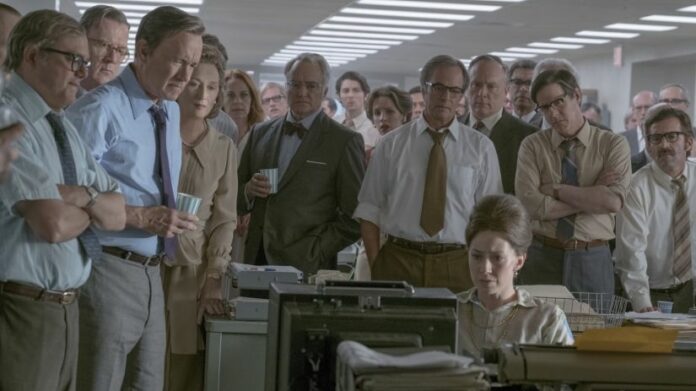Way back in the pre-fake-news time of 1971, the New York Times began publishing excerpts from the classified “Pentagon Papers,” stolen from the Rand Corporation. The damning revelations about four American Presidents (Truman, Eisenhower, Kennedy and Johnson) lying about the real reasons for the Vietnam War rattled President Nixon so much that his Attorney General John Mitchell invoked the Espionage Act and a judge ordered the Times to “cease and desist.”
Using a script by Liz Hammer and Josh Singer, producer/director Steven Spielberg has created a fast-paced, historical movie perfectly timed to coincide with the current American President’s war against the press. Surprisingly, the film opens in a Vietnam jungle circa 1966, where State Department military analyst Daniel Ellsberg (Matthew Rhys) is embedded with a platoon of soldiers that head into a night-time battle. On the flight home, Secretary of Defense Robert McNamara (Bruce Greenwood) asks Ellsberg if America is winning the war, to which he replies “Things seem pretty much the same as last year.” When they land, Ellsberg overhears McNamara lying to reporters about how great things are going in Vietnam. At that moment, Ellsberg becomes a self-described “peacenik.” Five years later he photocopies the top secret documents and brings them to the Times.
Newspaper heiress Kay Graham’s (Meryl Streep) father founded The Washington Post, her husband took the reins after her father’s death, and after his suicide, she has finally become publisher herself. Despite her protestations that she has “always been a newspaperwoman,” she has actually focused on being a successful Washington hostess, friend to Presidents, and White House Cabinet members—including Robert McNamara. Graham and McNamera are so close, he hand-picked the Post’s Board Members to help “guide” her as the new publisher. With the Post in financial trouble, Graham is planning on saving the paper’s future by floating a public stock offering. With her title and prestige, she frequently finds herself “the only woman in the room,” where the men condescendingly treat her as the patriarchy has always treated females.
When the Times prints excerpts from the Pentagon Papers on their front page, Post editor Ben Bradlee (Tom Hanks) sends his reporters out to find their own version of the leaked documents. Assistant editor Ben Bagdikian (Bob Odenkirk) not only tracks down Ellsberg, but scoops up over 4000 pages of material. Unfortunately, these are out of sequence, so Bradlee invites his top reporters to his home where, under the time pressure of the next press run, they read excerpts aloud and try to match pages together like doing a jigsaw puzzle. Spielberg adds his trademark humor to this sequence by having Bradlee’s daughter set up a lemonade stand to sell drinks to the reporters—and keep raising the prices as the time ticks down.
Lawyers are soon added to the mix, and the decision to “run” excepts from the top secret papers comes down to a “yes or no choice” that only Kay Graham can make. We watch with delight as the fast-paced conflict between what is right for the business and what is right for Freedom of the Press in the United States become the crucible that forges both heroes and villains. This is great movie-making, rousing West-County audience members to rise up and applaud what they have just seen.
Comments? E-mail gi*********@co*****.net
46.5
F
Healdsburg
April 19, 2025








